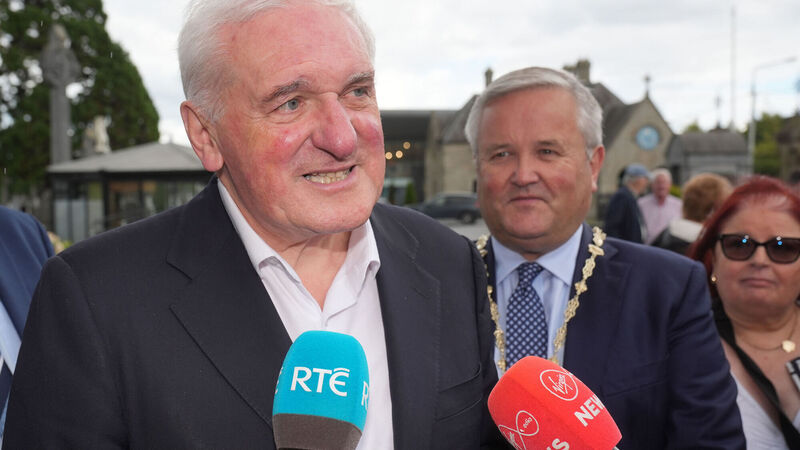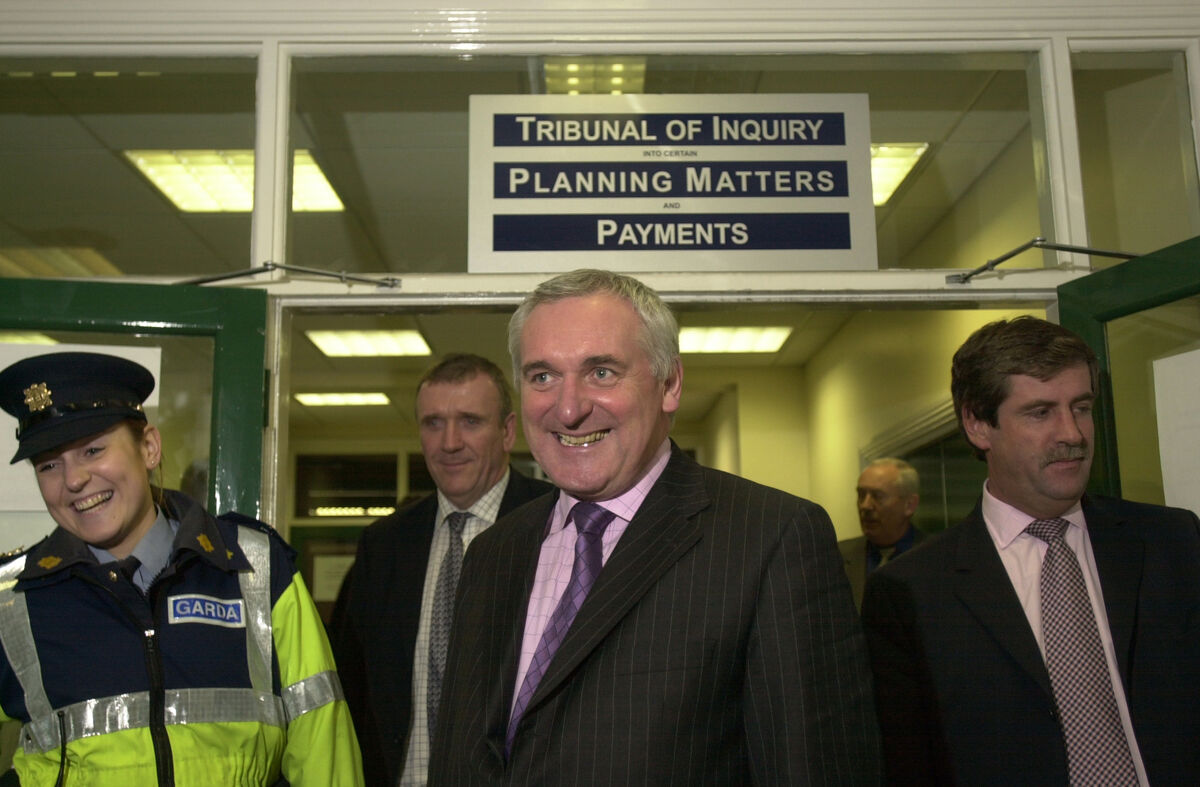Paul Hosford: Still waiting for forgiveness, Bertie Ahern bows out of the race for the Áras

Former taoiseach Bertie Ahern speaking to the media during an event at Glasnevin Cemetery, Dublin, for the 50th anniversary of Éamon de Valera’s death last month. Picture: Brian Lawless/PA
In the end, there was no TV interview. There was no two-page spread in a Sunday newspaper, no head-to-head with David McCullough or Claire Byrne or Pat Kenny. There was no press conference.
In the end, there was just Bertie Ahern holding court for 35 minutes as he railed against Fianna Fáil’s leadership, his exclusion from its consideration for the presidency and, in large part, his sense that his reputation and legacy had been unfairly maligned by the findings of the Mahon Tribunal.
In the end, it was probably as Bertie as it could get.
When Mr Ahern was spotted at a Fianna Fáil event a little over a week ago, it was amid fervour around two prospective nominees for the party’s choice for the presidency — MEP Billy Kelleher and former Dublin Gaelic football manager Jim Gavin. But Mr Ahern’s name has been linked to the role for so long that it made no sense to the gathered media not to ask the question.
Speaking in Glasnevin, the former taoiseach said he had asked party higher-ups last December if he would have Mr Martin’s support for a run but only received an answer in a newspaper report, which he said had disappointed him.

“I haven’t ruled myself out,” Mr Ahern said.
“I never ruled myself out. So that means if you don’t rule yourself out, you’re in.”
Pointless to continue without party support
But Mr Ahern’s return to the conversation about Michael D Higgins’ successor would last less than a week as waves of Fianna Fáil TDs and senators pledged their support to Jim Gavin or Billy Kelleher and, without the blessing of party leadership, Mr Ahern felt it was pointless to continue.
While he laid out why he believed that he would be a good president, Mr Ahern was unequivocal that the imprimatur of the leadership was a necessary ingredient for any run.
“I’m proud of the fact that I played a role in helping to secure peace on the island, following on from Albert Reynolds’ work to ensure that every community was represented and that the promise of a shared and stable future could be realised, and representing Ireland on the world stage during those historic moments has been one of the greatest responsibilities of my career,” said Mr Ahern.
On that basis, I’m confident my experience and service would have qualified for the role of president.
“In truth, it’s because I respect the Fianna Fáil party, its membership, and its elected and unelected people that I feel I could have been a good president for the people and feel that I’ve given the time to do so I could have run a campaign to seek their support.
“But I think, without the support of the leadership of your party, in all my time in Fianna Fáil I’ve never seen a period where the leadership really lose out in these things.
“That’s the way it’s been in my time and other times as well.
“And particularly when the leadership indicates so strongly and personally gets involved for a candidate, it’s unlikely that the leader loses out on these things.”
One could not, based on those comments, accuse Mr Ahern’s political radar of malfunctioning.
With over 30 members of the parliamentary party backing Mr Gavin and around 10 or more in Mr Kelleher’s corner, Mr Ahern would have to change minds in short order to stand any chance and, with Micheál Martin backing Mr Gavin, that is likely a task that even a man who won three general elections as party leader might struggle with.
Still relitigating the Mahon Tribunal
“I suppose he saw, in his view, that there was a candidate 20 years younger, and somebody kind of from outside the party,” Mr Ahern said of the man who now holds his own job, while suggesting that Mr Martin had “indicated in the past why he was anti-me was to do with the Mahon Tribunal and the economy”.

While Mr Ahern was in the mood to talk about the Mahon Tribunal, he was more in the mood to relitigate it and dispute its findings as he has always done.
“I gave the tribunal truthful evidence and reject completely any suggestion that I did otherwise,” he said.
He later added:
“Friends of mine gave money, not any robbers or crooks or gangsters. Friends of mine all went to the tribunal, gave evidence that they did, all explained the money.
To reiterate what I’ve said a million times, I answered all the questions put to me to the best of my ability. I’m satisfied with the account I gave it.
Those words were in contrast to the findings of the tribunal, which accepted Mr Ahern’s claim that he did not have a bank account for years between 1987 and 1993, and that he usually cashed any wage or expenses cheques given to him in that time, but rejected his evidence that he had built up around £54,000 in savings during that time.
The tribunal went on to say that it could not account for the source of eight various lodgements, including a lodgement worth £24,838.49 in October 1994, made following a dinner in Manchester.
Mr Ahern contended that over two-thirds of this was made in a lodgement of Irish punts, but the tribunal said it was solely in sterling, a rejection of his story that the sterling money was a “dig out” from some friends.
There were also questions around a lodgement worth £28,772.90 in December 1994, and two lodgements made to accounts controlled by Ahern’s then partner, Celia Larkin and sterling lodgements to the accounts of Mr Ahern and his daughters, which Mr Ahern said had comprised of sterling built up in the UK by occasional exchanges of his Irish wages.
The tribunal was also satisfied that an account set up for the upkeep of the former taoiseach’s St Luke’s constituency office was used for purposes other than that.
Bertie's greatest hits
In total, the 35 minute meeting with supporters, recorded and uploaded to YouTube, was something of an odd greatest hits for a man whose reputation remains complex.
On one hand, to many, he is the character laid out in the Mahon Tribunal and the architect of the financial crash.
On the other, some view him as a key negotiator of peace in Ireland, a man who represented Ireland with ease among world leaders, and whose government oversaw a period of untold prosperity.
Not a viable candidate
In recent years, Mr Ahern had seemed to lean into the latter reputation, particularly around his achievements in helping to steer the Good Friday Agreement, but that has not been enough for Fianna Fáil leadership to see him as a viable candidate, leading to a subdued ending to his lone remaining political aspiration.
“I do not know exactly how long one has to wait to be forgiven, or whether my sins were greater or less than anyone else, but there’s no way to know,” he said.
“In any event, I would have happily given my account in an election campaign, if I was asked to do so, as I’ve done to you here tonight, and done many times before.”
In the end, Mr Ahern may have wanted to account for his record, but the end of his presidential campaign came on a group call on a Thursday night.
Read More
CONNECT WITH US TODAY
Be the first to know the latest news and updates






